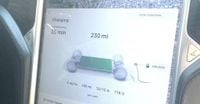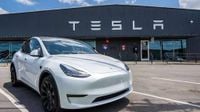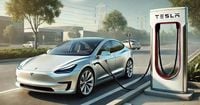A class action lawsuit filed in California against Tesla alleges that the automaker is deliberately inflating odometer readings on its electric vehicles, leading to premature warranty expirations and significant repair costs for consumers. The case, which has drawn comparisons to the infamous "Dieselgate" scandal involving Volkswagen, raises serious questions about the integrity of Tesla's mileage tracking systems.
The lawsuit, initiated by Nyree Hinton, a data professional from Los Angeles, centers around his experience with a used 2020 Tesla Model Y purchased in December 2022. At the time of purchase, the vehicle's odometer read 36,772 miles. However, Hinton soon noticed an alarming discrepancy: despite only driving approximately 20 miles a day, the odometer indicated an average of over 72 miles per day. This unexpected surge in mileage not only caused the vehicle's warranty to expire much sooner than anticipated but also resulted in Hinton facing a $10,000 suspension repair bill that he believed should have been covered under the warranty.
According to the lawsuit, Tesla employs a system that utilizes predictive algorithms, energy consumption metrics, and driver behavior multipliers to manipulate and misrepresent the actual mileage traveled by its vehicles. The legal documents assert that this practice allows Tesla to accelerate the depreciation of its vehicles and the expiration of warranties, thereby reducing its obligation for contractually required repairs and encouraging consumers to purchase extended warranty plans.
Hinton's claims are supported by his own meticulous tracking of the vehicle's mileage, but the lawsuit also references similar complaints from other Tesla owners shared on forums and social media. "Rather than relying on mechanical or electronic systems to measure distance, Tesla Inc. employs an odometer system that utilizes predictive algorithms... that manipulate and misrepresent the actual mileage traveled by Tesla vehicles," the lawsuit states. This raises concerns about whether Tesla is intentionally misleading its customers.
The implications of the lawsuit are significant, potentially affecting over 1 million Tesla vehicles in California alone. If the allegations are proven true, it could mark a pivotal moment for the company, which has faced scrutiny over various aspects of its operations in the past. The case has been moved from California state court to federal court in Los Angeles, where Hinton and other plaintiffs are seeking both compensatory and punitive damages.
Electrek, a publication focused on electric vehicle news, reached out to Green, a well-known Tesla hacker, for insight into the situation. Green expressed skepticism about Tesla's ability to conceal such practices from the broader hacking community. He acknowledged that while Tesla likely uses predictive algorithms for its odometer, it could merely be a method of accounting for tire wear, which is a common practice in the automotive industry.
Hinton's lawsuit is not Tesla's first encounter with legal challenges regarding its vehicle performance metrics. Earlier in 2024, a federal judge ruled that a separate case involving allegations of exaggerated driving range must be pursued through individual arbitration rather than as a class action, indicating a pattern of legal scrutiny surrounding the company.
As the lawsuit unfolds, it raises broader questions about consumer protection and corporate accountability in the electric vehicle market. The controversy surrounding Tesla's odometer practices echoes past scandals involving major auto manufacturers, such as Volkswagen's emissions cheating scandal and Mitsubishi Motors' fuel efficiency data falsification.
For now, Tesla has denied the allegations but has not provided further comment on the matter. The company is facing mounting pressure to clarify its practices and ensure transparency regarding its vehicle performance metrics. As more details emerge, consumers and industry observers alike will be watching closely to see how this legal battle unfolds and what it means for the future of electric vehicle manufacturing.
The outcome of Hinton's lawsuit could have far-reaching implications for Tesla and its customers, potentially reshaping the landscape of electric vehicle warranties and consumer rights. As the case progresses, it remains to be seen whether Tesla will be held accountable for the allegations made against it or if the claims will be dismissed as unfounded.







